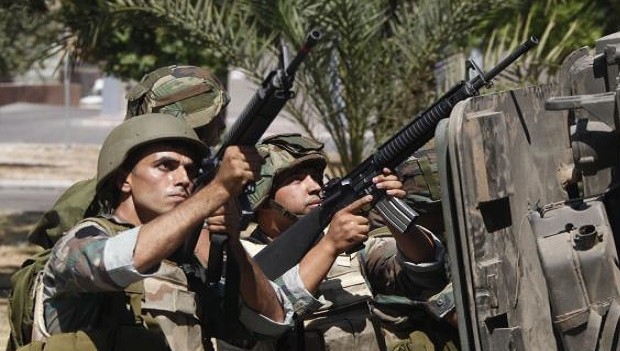The Lebanese have been known since ancient times for their love of adventure, sailing to and living in faraway countries in search of success.
Most of the pioneering Lebanese migrants were ignorant of geography and history, as well as foreign languages. Nevertheless, ignorance never stopped them from achieving their goals. Their ignorance of geography and history these days will lead to serious consequences as well as leaving them and their country sat on a volcano.
Last week an armed group abducted a Turkish airline pilot and co-pilot after stopping their shuttle near Beirut’s International Airport. Incidentally, the airport is called Beirut-Rafic Hariri International Airport but lies on the edge of Dahieh, which includes Hezbollah’s security square in the Lebanese capital. A dispute over “airport security” in 2008 led to the clashes that marked Hezbollah’s transformation from a force resisting Israel to an armed occupation force that uses weapons to protect its right to have weapons in Lebanon.
After the kidnapping was accomplished, Hayat Awali, described as a spokesman for the families of the kidnapped pilgrims in Syria, announced: “Any Turkish national in Dahieh and the city of Beirut will be a target for the families of the kidnapped [pilgrims] in retaliation to the information branch of the Internal Security Forces, to make everything clear.”
“Every Turkish national in Lebanon is responsible for [the deeds of] the information branch,” she added.
It is also to be noted that Awali’s declaration of war against Turkey includes a condemnation of the Internal Security Forces, (perhaps) the only security force that, until this moment, still undertakes its tasks with a modicum of freedom, in light of Hezbollah’s dominance over the state.
A few hours following the kidnapping, militants near the Shi’ite-majority Al-Labwa town in north-east Lebanon opened fire on the convoy of the mayor of the Sunni-dominated town of Arsal Ali Al-Hajiri, after he was overseeing a hostage swap between two clans in the area. Hajiri and two others were injured in the ambush while one of the mayor’s companions was killed.
Regarding the ambush, it is almost normal for such a thing to happen in a tribal area which Hezbollah uses as a passage for his militants heading to Syria, while at the same time the town’s residents who are sympathetic to the Syrian revolution host Syrian refugees and the injured. This is not to mention that state sovereignty is absent across Lebanon, let alone in this area, which is considered as one of the most significant of Hezbollah’s strongholds.
However, what was really surprising is that Al-Labwa Mayor Ramez Amhaz held a press conference right after the ambush in which he held Hajiri, the victim, responsible on the pretext that he “always roams the area in an armed convoy in a manner that provokes the citizens.”
We should quickly note that Arsal is a Lebanese rather than a Swiss town and is military besieged as well as riven by sectarian divisions.
It is very normal that clans have weapons in northern Beqaa, where Al-Labwa, Arsal and the villages of Baalbek and Harmel districts are.
The real problem lies in Awali’s declaration of war against Turkey—a country populated by 80 million and that until 1918 governed Lebanon and Syria as well as neighboring countries— and Mr. Amhaz’s press conference. These two steps reflect the terrible reality of the mentality controlling Lebanon, a country that was not long ago a beacon of enlightenment, openness, interaction and coexistence not only on a local level but also throughout the Middle East and even beyond.
I belong to a generation when the world’s greatest tennis players, such as Rod Laver, Roy Emerson and John Newcombe participated every year in Open Brummana Tournament. I also remember that the Miss Europe beauty pageant used to be organized in Casino du Liban. What is more, I understand that the American University of Beirut (AUB) is home to the largest number of representatives for the San Francisco Conference that established the United Nations in April 1946.
This is how Lebanon used to be; Lebanon which I still remember and recognize. Today, however, Lebanon is another country that is completely different from what it was.
We are now in a state of collapse of awareness and an absence of logic that uses the Lebanese people as a cheap fuel for wars bigger than themselves and their country. Lebanon—a country that would not rise or stand firm, were it not for national consensus as well as the exceptional economic success— is transformed into a “mailbox” from which letter bombs are directed in all directions.
Responsibility, naturally enough, does not fall on ordinary citizens made arrogant by their power; rather, it rests with the leaders who tempt citizens and involve them in regional projects that may drag them, before anyone else, into the abyss.
The entire region is facing difficult challenges that threaten to redraw its borders. The setbacks we are experiencing will definitely transform the countries of the region into failed ones on whose rubble major international bargains will be made. This brings us to the famous political historian Arnold J. Toynbee whose “challenge and response” theory holds that a civilization results from a series of difficult challenges that stimulate creative minorities to work out solutions in order to redirect society. Thus, the success of a certain society in meeting challenges will lead to improved welfare and growth. However, a civilization becomes shaky and feeble when leaders begin to lack creativity. When it falls victim to national or racist fanaticism and military trends, as well as the tyranny of an authoritarian minority, a civilization collapses and disappears.
Lebanon, together with post Sykes-Picot countries, is past having non-creative leaders. In fact, the Lebanon of today, along with its neighbors, are paying the price of national fanaticism— in its racist and chauvinistic form— and militarized rule as well as the tyranny of a minority.
